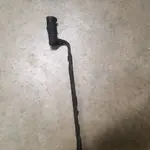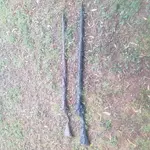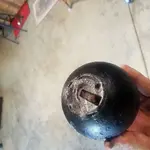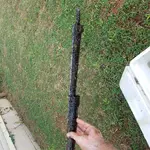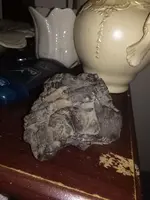What are some of the findings of the group concerning hunting in such places. Besides the obvious problems with hunting protected sites.
If you happen to live in the US it depends on a lot of things. If the ruins are on public land and you get caught digging them you can join a lot of other residents of the various prison systems in the country who got caught doing the same thing. Chaco Canyon, for instance, has a display case in the lobby of their museum with an accumulation of legal documents of arrests and artifacts used in evidence to prosecute the people who picked them up.
If the land's 'private', but has a stock pond on it paid for by the US Conservation Service and the right enforcer catches you digging it and turns you over to the right prosecutor you might beat the rap but you mightn't beat the ride. There are several cases of such incidents over the past few years, the theory being that the privateness of the ownership was compromised by,
1) a federally insured loan against the land,
2) government grants to pay for brush removal, fences along the perimeter adjacent to government land,
3) ambiguousness on the part of the owner as to whether the person caught had 'permission' to dig it (permission in a legal sense after the question arises whether to prosecute the owner for giving you permission, which tends to create ambiguousness and an importance of the actual words used in the granting of the permission).
Additionally there's a problem with the fluid and dynamic nature of the interpretation of the statutes on-the-spot by enforcers and prosecutors. Something that might have been perfectly legal a few minutes ago can become illegal as it involves what you were just observed doing and are in the process of being arrested for.
The smart money these days does its digging on a tiny scale and in awfully out-of-the-way places, quits what he's doing when he hears the sound of a gasoline engine of any sort and assumes an attitude of indignant innocence about what 'someone' did here and is prepared to ditch any artifacts in the space of a moment.
It's also an not a bad idea to keep in mind that you can have your picture taken from almost any angle these days, almost anywhere, without any knowledge that you've been posing for a camera. The likelihood is reduced if you make what you are doing brief, but if the place you're admiring that interesting 'thing' sticking up out of the ground happens to be one where previous people have shared your interest in things of that sort, and if someone had some budget money they needed to get rid of before the end of the fiscal year, you might be well served by smiling and washing your hands after you zip up your pants.
There's no law yet against not doing it, unless you're involved in serving food to the public, but who wants to have a courtroom full of people saying, "That guy didn't even wash his hands after he did that!"



